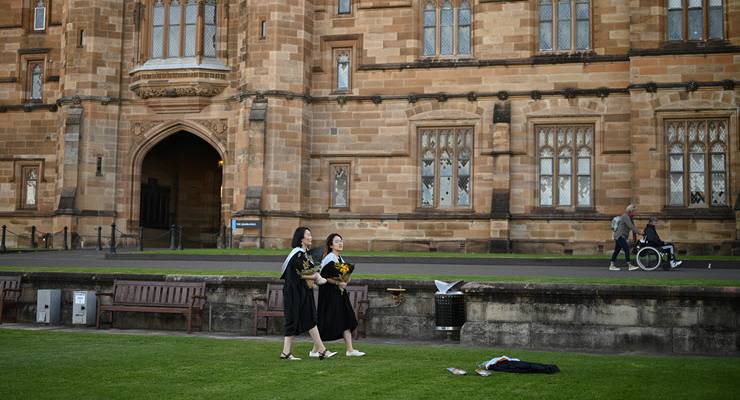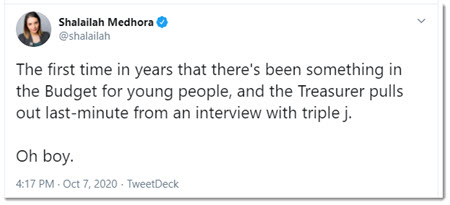
Josh Frydenberg’s July provocation that his economic response to the coronavirus crisis would be inspired by Margaret Thatcher and Ronald Reagan wasn’t fully realised.
His budget was in fact an ideological hodgepodge of traditional conservative and Keynesian elements.
Yet it remained deeply Thatcherite in one important respect. Maggie saw economic policy as a means to “change the soul”, to remould individuals’ hearts and minds to increase their economic utility and cultural conformity by rewarding the good and punishing the bad.
This is perhaps the defining feature of the Morrison government. The Monthly’s Richard Cooke aptly called it “welfare chauvinism”, “the post-free-marketeer idea that government spending should be retained (or increased), on the proviso it is directed to preferred groups … a reward for good behaviour that can also be withdrawn as a punishment.”
We have seen this strategy in the government’s determined frugalness towards universities, the ABC and the arts despite record spending elsewhere. And last week we saw the government turn its attention to younger generations, steering them away from perceived enemies and towards conservative cultural preferences.
Gold stars for agriculture, demerits for humanities
The Australian news media was quick to paint young people as budget “winners”. Indeed, there was a surprising focus on reducing youth unemployment, even to the potential detriment of older workers.
But below the headline figures, the government smuggled in some conditions that seek to reorient young people’s life choices towards those culturally and electorally favoured by the Coalition.
Take the budget’s $4 billion wage subsidy scheme for employers hiring unemployed people under 35. As young people have been disproportionately impacted by the coronavirus recession and will experience long-term scarring, the government is right to prioritise them in the budget, even if the scheme design is questionable.
However, as with the JobKeeper scheme, this subsidy excludes local, state and federal agencies including most universities, arts organisations and our national broadcasters.
Their exclusion would not be such an issue if the government instituted separate support schemes in these institutions to retain existing workers and employ new ones, but such have either been non-existent or paltry. The ABC has now paused its cadetship program for young journalism graduates and pathways for early career researchers and academics have been decimated.
Meanwhile, the government passed its university fee changes on Thursday after some horse-trading with the Centre Alliance. This will result in significant increases to the cost of humanities and law degrees and reductions to others including agriculture and STEM.
The contribution rates bear little resemblance to job outcomes and, given the incentive structure will likely backfire, seem instead to reflect political preferences about which students should be saddled with the most debt.
Students gifted in disciplines not deemed “national priorities”, which happen to involve critical evaluation of public policies, will face financial barriers those in less political fields do not.
Perhaps the most egregious favouritism was displayed in the government’s welfare incentives for unemployed young people to pick fruit in the regions. Deputy Prime Minister Michael McCormack has propped up labour supply for unattractive businesses, based on a laughably romantic vision of farm life imbued with cliched associations of agriculture with character-building hard yakka.
Nudging us into the fold
Given the Coalition struggles to appeal to younger voters, you might have thought it would use its youth jobs subsidy as an electoral olive branch. But it appears to have given up on persuading youth — for instance, the treasurer cancelled his interview with the ABC’s Triple J this week.
Many conservatives evidently think young people will only agree with them once they are barred from liberal pursuits like history and sociology and put to work ploughing fields where their animal spirits reawaken. Their only strategy to increase their youth vote is by making the youth look more like their voting base.
But there are far easier ways to appeal to young people than social conditioning — gens Y and Z hold relatively small ‘c’ conservative views on family, community and place, which could be tapped into with, say, fewer investor-focused housing policies.
Young people should be afforded government assistance in this once-in-a-generation recession without compromising their dreams or dancing to a prescribed tune.
Instead of imposing paternalistic restrictions, the government should listen to us.









It’s a big claim – “…gens Y and Z hold relatively small ‘c’ conservative views on family, community and place” – citation needed, as they say in the classics.
As for “…the government’s determined
frugalness…”? Did you mean frugality?Richard Cooke’s article was, as usual, the most insightful piece n the subject. He is the pre-eminent thinker in Australian journalism, bar none, and has been for a decade. Not even Rundle can come close to him.
Speaking of which, where is Rundle these days? I think Crikey might want to re-think whether they keep him employed or not, far and away the best thing Crikey has going for it.
Increasingly, one might say that Grundle was the only one.
Maggie said ‘there is no such thing as society’, and her acolyte, little Joshie, is putting it into practice.